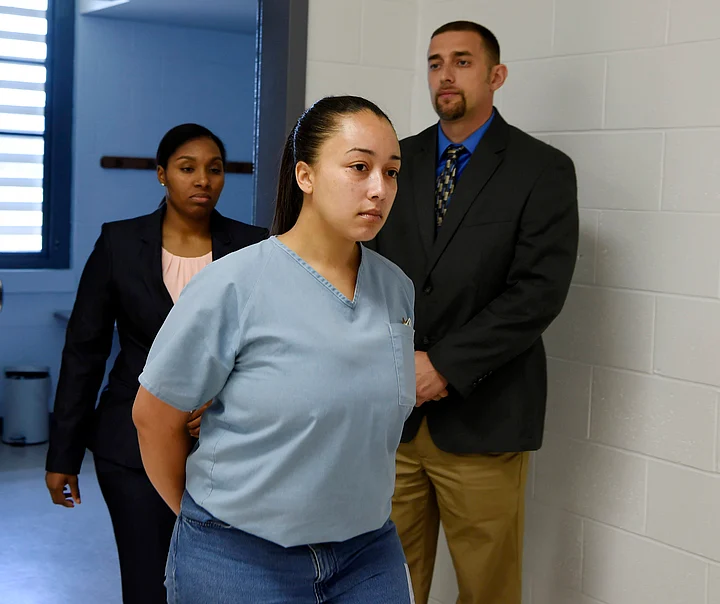Fifteen years after Cyntoia Brown was charged with murder, the woman who says she was a 16-year-old sex trafficking victim when she killed a man in 2004 is no longer under a life sentence.
Following years of national attention from criminal justice advocates, celebrities and politicians calling for mercy — and just days before he is to leave office — Tennessee Governor Bill Haslam on Monday granted clemency to the now 30-year-old Brown.
"Cyntoia Brown committed, by her own admission, a horrific crime at the age of 16. Yet, imposing a life sentence on a juvenile that would require her to serve at least 51 years before even being eligible for parole consideration is too harsh, especially in light of the extraordinary steps Ms Brown has taken to rebuild her life," Haslam said in his statement.
Brown will remain on parole supervision for 10 years on the condition she does not violate any state or federal laws, holds a job, and participates in regular counselling sessions.
While law enforcement officials had opposed clemency, arguing Brown was not justified in killing 43-year-old Johnny Allen, celebrities like Kim Kardashian West and singer Rihanna spoke out for Brown. The governor's office received thousands of phone calls and emails from supporters.
"Thank you Governor Haslam," Kardashian West tweeted soon after news of the clemency decision broke. Similar high-profile responses poured in from former Georgia Democratic gubernatorial candidate Stacey Abrams, actresses Alyssa Milano and Viola Davis.
Brown was convicted in 2006 of murdering Allen, a Nashville real estate agent. Police said she shot Allen in the back of the head at close range with a gun she brought to rob him after he picked her up at a drive-in theatre in Nashville to have sex with her.
Brown's lawyers contended she was a victim of sex trafficking who not only feared for her life but also lacked the mental capacity to be culpable in the slaying because she was impaired by her mother's alcohol use while she was in the womb.
According to court documents, Brown ran away from her adoptive family in Nashville in 2004 and began living in a hotel with a man known as ‘Cut Throat,’ who forced her to become a prostitute. Court documents say he verbally, physically and sexually assaulted her.
One night, Allen picked up Brown at a Sonic Drive-In and she agreed to engage in sexual activity for $150. Once at his place, Brown eventually got into Allen's bed. Brown told authorities she thought he was reaching for a gun, so she shot him with a handgun from her purse.
She took two of his guns and his money from his wallet before fleeing the scene.
Brown expressed thanks in a statement released Monday by her legal team.
"I am thankful for all the support, prayers, and encouragement I have received. We truly serve a God of second chances and new beginnings. The Lord has held my hand this whole time and I would have never made it without him," Brown said. "Let today be a testament to his saving grace."
The US Supreme Court has ruled against life-without-parole sentences for juveniles. Yet, the state of Tennessee argued successfully in lower courts that Brown's sentence was not in violation of federal law because Brown did have a possibility for parole: She was sentenced to serve at least 51 years of her life sentence.
"We need to see this as a national awakening to change the draconian laws that allow juveniles, children, to be placed in adult prisons when they're just children. They're not little adults," said Houston Gordon, one of Brown's lead attorneys.
While in prison, Brown completed her GED and took college classes. She is currently one course away from finishing a bachelor’s degree at Lipscomb University.
Nashville Mayor David Briley praised Haslam's decision, calling it a "great day for social justice and our city." Democratic state Senator Raumesh Akbari said the clemency announcement shows that Tennessee "can show love, compassion and mercy" for people who have experienced trauma.
Haslam's decision comes as he's considering his next political move in Tennessee now that US Senator Lamar Alexander announced he won't seek re-election in 2020. It's not yet clear how the clemency decision may affect Haslam's already solid popularity throughout the state.
In contrast to Democrats, Tennessee's Republican lawmakers remained markedly quiet on Haslam's decision.
Governor-elect Bill Lee offered a brief statement, saying he "respected" Haslam's choice in the complex case and Lt Governor Randy McNally said he "appreciated" the process the governor went through to arrive at his decision.
Ed Yarbrough, another attorney for Brown, joked at a Monday press conference that he was brought on as the "token Republican" in Brown's case.
"I have to give a lot of credit to Governor Haslam for having the wisdom and the compassion to do what he did today," he said. "It will not be popular with everyone in Tennessee, but he did the right thing and we praise him for that."
To date, Haslam has granted five commutations, 15 pardons, and one exoneration. The Republican says he is continuing to review and consider additional clemency requests.
(Reporter Jonathan Mattise contributed to this report.)
(At The Quint, we question everything. Play an active role in shaping our journalism by becoming a member today.)
